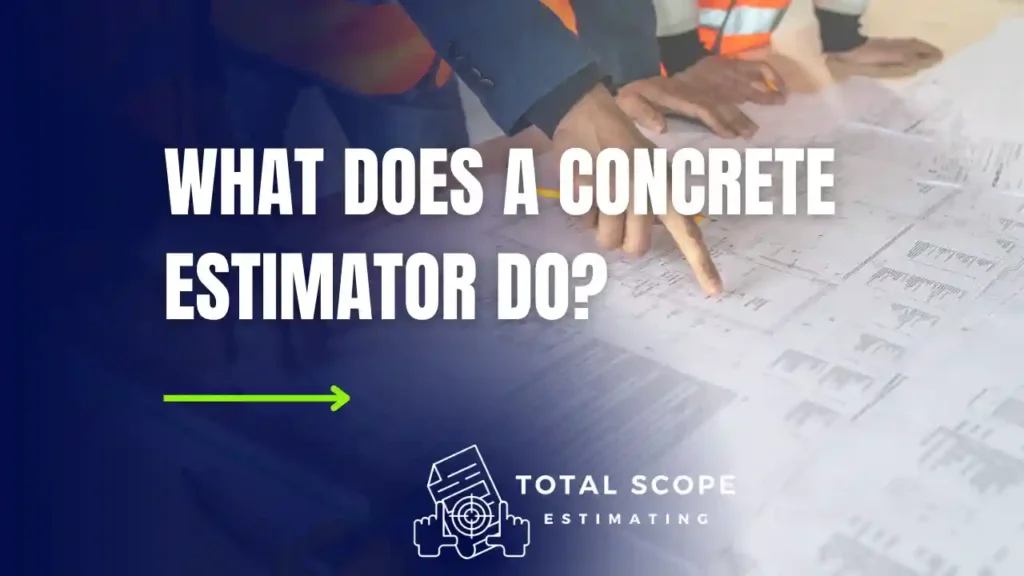Construction is a complex task, and all contractors and business owners make efforts to complete their projects within the timeline and estimated budgets. However, when construction involves concrete, it becomes much more complicated. Here are the steps for the role of a concrete estimator.
You might wonder what a concrete estimator does. Though their role seems relatively straightforward in theory, it is far more complicated in practice. It requires a profound understanding of material costs, correct methodology and tools, accurate project management, and a deep knowledge of financial costs.
In this article, we will examine the roles and responsibilities of concrete estimators and what they do in real life. We will delve deep into the intricacies of concrete estimating and explain why it is essential for the success of any construction project.
The Role Of a Concrete Estimator
The primary role of a concrete estimator is to estimate the cost of the entire concrete project until its completion. This involves a deep understanding and detailed breakdown of all the material costs, labor, concrete types and quality, and other overheads. Concrete estimating services experts offer services for all kinds of concrete projects, from small residential housing schemes and buildings to large-scale infrastructures and improvements.
But being a concrete estimator is far more than just crunching numbers. It involves a deep understanding and consideration of every expense, thus allowing for a final analysis of the concrete cost estimate. It consists in calculating all the material costs, type of concrete used, labor costs, transportation costs to transfer the required material to the project site, labor expenses, fees, permits, medical safety, and preparation for unexpected circumstances.
Any inaccuracy in the concrete cost estimates can lead to project delays, time delays, cost overruns, and, ultimately, the loss of future concrete contracts. Therefore, accuracy and precision are key factors in the concrete cost estimates.
Key Responsibilities Of A Concrete Estimator
Reading Blueprints and Specifications
Before providing an estimate for a concrete project, a concrete estimator needs to understand the construction project completely. To this end, he carefully reviews all the project blueprints and architectural and mechanical plans before starting the project. He will also consider the building’s size, intended use (residential or commercial), number of rooms, etc.
This blueprint helps him understand the necessary information and plan his concrete cost estimates accordingly. It also allows him to understand the scope of the project. This blueprint reading gives him a roadmap about various structural details of the project, ranging from a thorough study of the foundation to the amount of concrete required for foundations, roofs, structures, and high beams.
Concrete estimators also work closely with other architects and construction experts to ensure the project stays within the time limit and does not exceed the cost barriers set.
Material Takeoffs
The expert performs the material takeoff after understanding the project’s scope and size. This involves calculating concrete costs by examining the dimensions and structures of the project blueprints. The estimator also calculates the quantity, costs, and type of concrete required for other concrete structures, such as rebar, formwork, and curing compounds.
The material takeoffs must be accurate and precise, as any inaccuracy in the date can lead to budget overflow. It can also lead to underestimating the concrete, causing delays and additional expenses, or overestimating the concrete costs, ultimately leading to the project’s wastage. A good concrete estimator should have the knowledge and expertise to maintain the balance between underestimation and overestimation of the costs and achieve a top-notch quality of their cost estimates.
Labor Estimation
Along with material and quantity takeoffs, labor is also a significant factor that a concrete estimating expert needs to consider. Concrete estimators need accurate information and knowledge regarding how many workers will be required for the construction project, how much skill and expertise they should have, and how long it will take to complete the project. For example, a large commercial building will require more workers to pour concrete than a small residential building or housing area.
They should also delve deep to understand the local area prices of the labor or any other factors that could contribute to additional labor expenses like overtime, labor union, medical security, etc. A deep and practical understanding of these factors helps them to allocate the resources uniformly, avoiding time delays and costly surprises.
Project Scheduling and Time Management
A concrete estimator is also responsible for project management and scheduling. This involves creating a timeline for the timely delivery of the materials, concrete pour, and curing process. Concrete work is a very complex process involving the intricacies of time management. Any delay in the concrete work can impact the quality of the entire construction project.
They also need to consider external factors that can affect the concrete scheduling process, such as bad weather, poor site conditions, material availability, and collaboration with other trades in the construction project.

Conclusion
The role of a concrete estimator is crucial for both construction contractors and clients. Accurate estimates are essential for construction contractors as they allow them to plan project expenses better and allocate resources appropriately. They also help them ensure the project is completed within the estimated cost and timeline.
For construction clients, it helps them to foresee that they get the best value for their money. It helps them to ensure that the project starts with a strong stepping stone, both in terms of quality and finances.
Thus, the role of an estimator is very critical for any construction project. Contractors and clients can avoid cost overruns with a precise, comprehensive estimate, reducing delays and unnecessary expenditures.
At Total Scope Estimating, we understand the importance of accurate and detailed estimations. Our team of experienced concrete estimators is dedicated to helping you achieve project success by providing precise, reliable cost estimates that keep your project on track.





